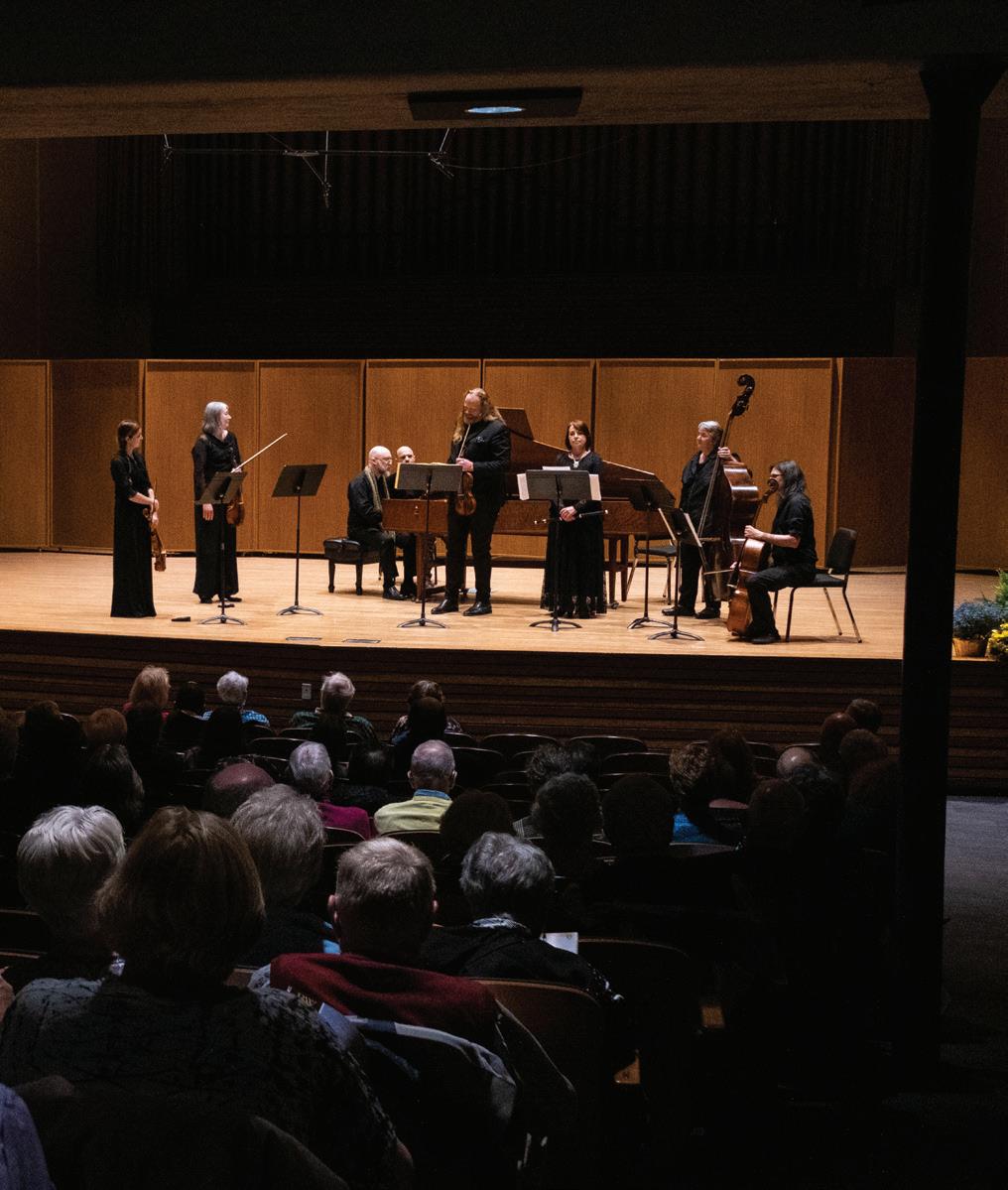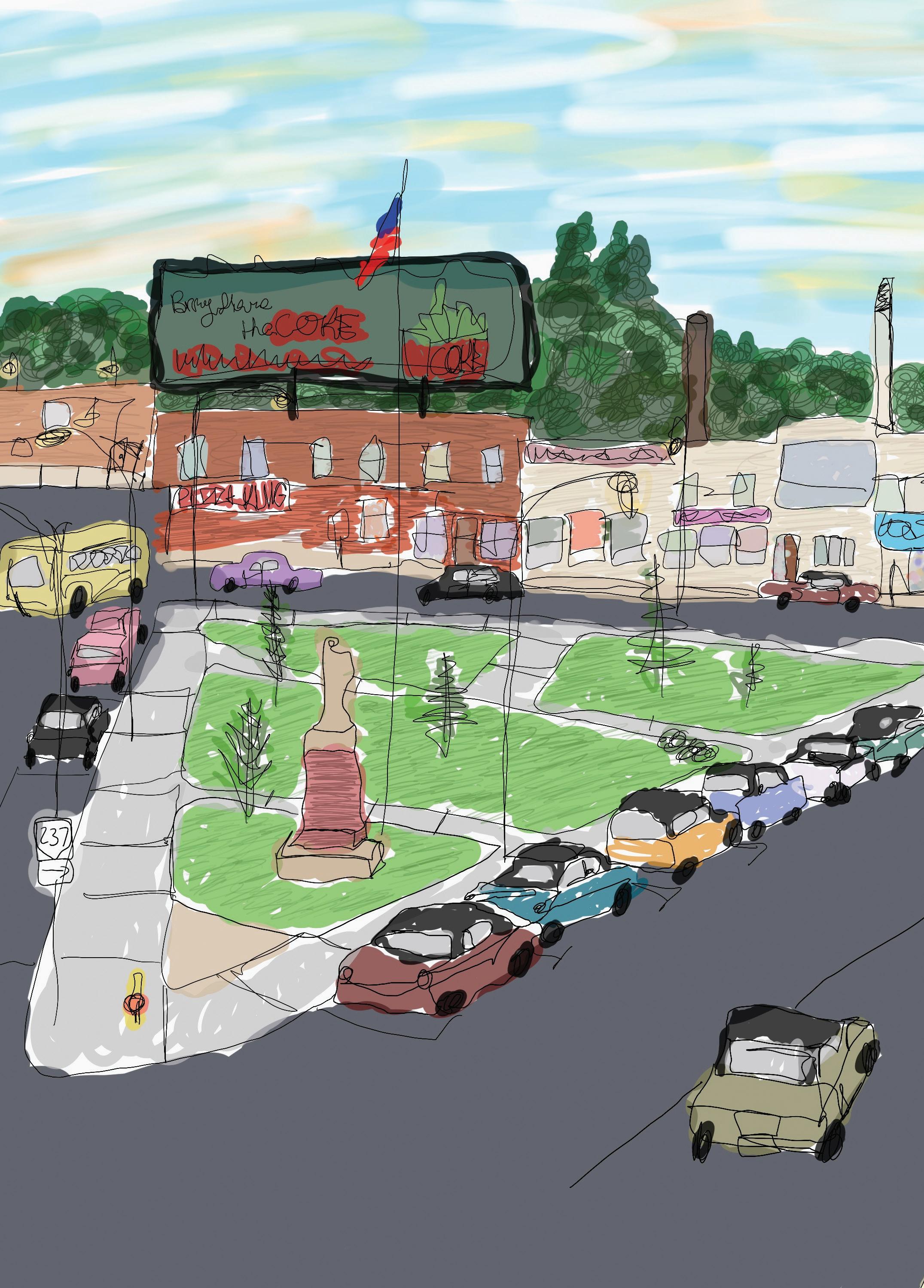




On April 17-18, Baldwin Wallace Music Theatre seniors traveled to New York City for their senior showcase, as a way for them to hopefully sign with an agent and begin to book theatrical roles.
The seniors have prepared since December 2022 to produce a 50-minute collective performance, a culmination of their BWMT experience. Rick Moyer, senior music theatre major, said that the performance markets their skills.
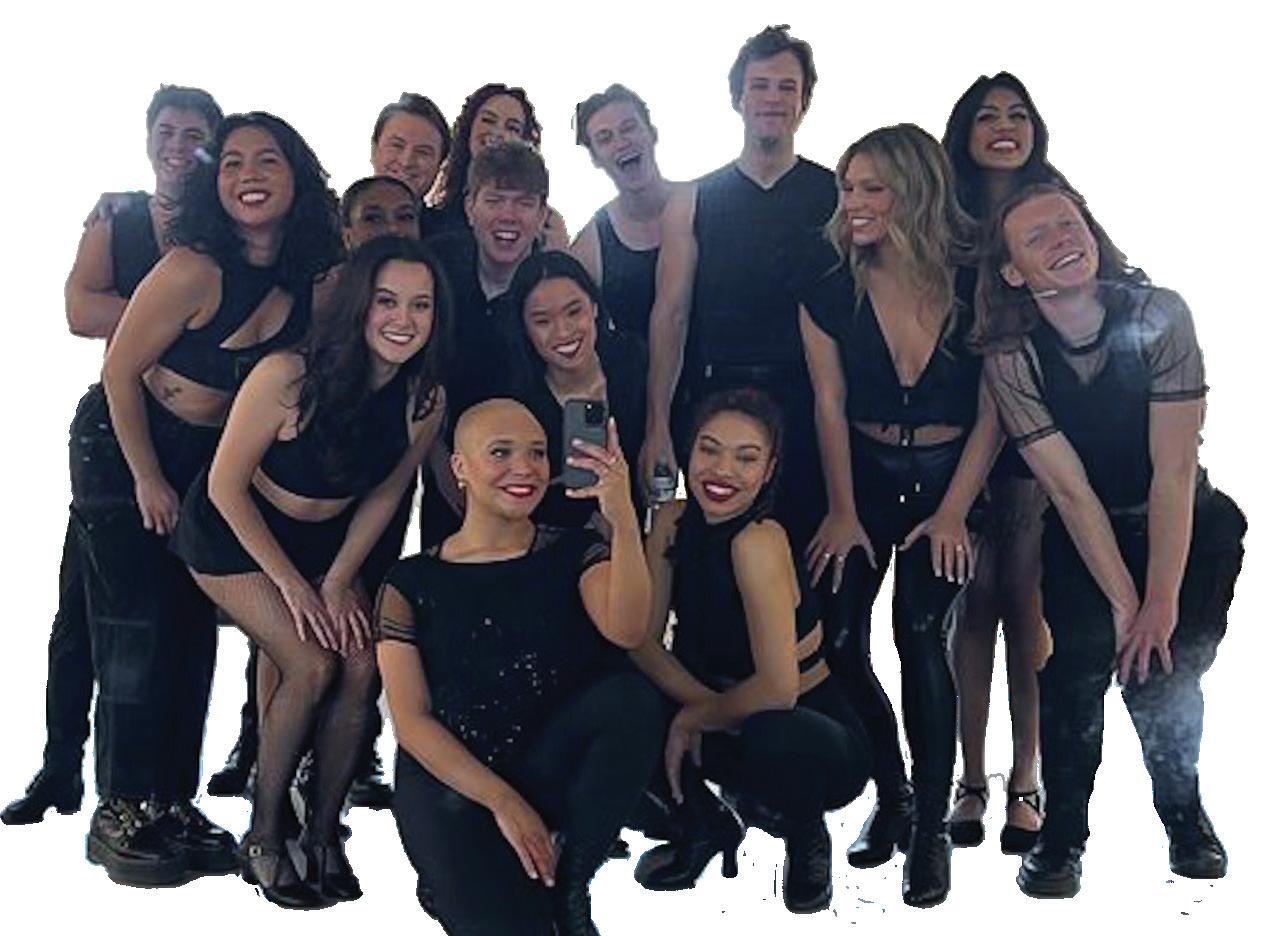
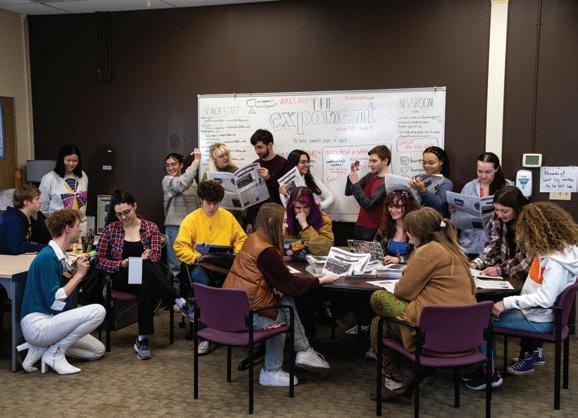
“Showcase basically acts as a marketing tool for the senior MT class,” Moyer

said. “It’s a collaboration between the students and Vicky, who’s our head of MT, and we basically work on two pieces of material that show each person off and their individuality.”
Each senior performed for about three minutes, and the music was cut in a way that meshed together, allowing for no pauses between two performers.
At the performance, Moyer sang “Let Me Drown” from “The Wild Party” and “If I Can’t Love Her” from “Beauty and the Beast.”
Senior music theatre major Kinza Surani performed “These Palace Walls” from “Aladdin” and said that she chose that piece because
Jasmine has always been a dream role of hers because she thinks that this character industry right now. Surani also sang “I Never Knew His Name” from “Brooklyn.”
“What I really love about it is it allows me to sing a full song in the time that you would normally have for a cut because it's so short, and there's a full story throughout the song,” Surani said.
Senior arts management and stage management student Michaela Henry student produced the Senior Showcase, and she worked behind the scenes to make sure that the event was organized and ran smoothly.
“It’s definitely just always a challenge to keep everyone on the same page and to be communicating with students and faculty and people in New York,” Henry said.
 By KAYLA MURO Staff Writer
By KAYLA MURO Staff Writer

On April 5, Baldwin Wallace University students voted for their respective class officers. Multiple elected officers are new students at BW and are finding ways to become involved on campus.
Jaime Yager, director of student engagement, said that she noticed an increase in participation in student government this year, especially with students in their first year at BW.
Kayela Swansiger, a junior psychology major and a mother of two children who transferred to BW in the Fall 2022 semester, was elected senior class president. Swansiger said she felt inclined to make the most out of her time at BW and take up leadership roles because of the motivation that her children provided.
“Because I don’t know
that many people yet, getting involved with groups on campus [has been] very helpful to figure out how things work and find support systems I can be a part of,” Swansiger said.
Emma Omerzo, a junior pre-allied health major, is in her first semester at BW and was elected senior class vice president. Omerzo said she saw a flyer about running for class officer positions in the hallway.
“I’ve been looking for ways to get involved because I don’t know anything about BW or my class yet,” Omerzo said.
“So, I found [the flyer] super appealing.”
Leah Kania, a first-year voice performance major, was elected sophomore class president for the 2023-2024 academic year. Kania was president of her high school student body and has always had an interest in leadership positions.
“I’m really excited to [see]
what fun things we do to get more students involved,” Kania said.
Being a first year, Kania wanted to get involved in leadership positions right away, and she joined Student Senate in the academic affairs committee for a head start. Since she hopes to work in higher education, Kania also said that being involved in leadership positions could aid her in professional endeavors.
Maya Morris, a freshman finance and marketing major, similarly to Kania, was also president of her high school student body. Morris said this interest continued and encouraged her to pursue student government as sophomore class secretary.
“I think [student government] helps you to connect with other people and get you comfortable with reaching out,” said Morris.
The Exponent's first annual Best of Berea Awards celebrate everything our readers love about the Berea and BW communities.
By HANNAH WETMORE Managing Editor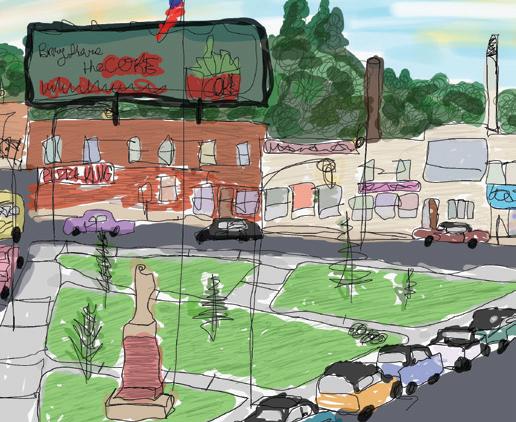
Baldwin Wallace University often boasts its close relationship with the Berea Police Department, and while some students see the strong police presence on campus as a sign of safety, some students have expressed to The Exponent that it may have the opposite effect.
One such student is
Declan Shields, a sophomore international student studying abroad from England, who said that he experienced a change of environment in moving from a university where they only have security guards, and where police officers don’t carry guns.
“It just feels a lot more aggressive,” Shields said. “It feels like they’re watching you, even if you’re not doing anything wrong.”
Shields was unaware of
“But it’s been a really exciting challenge to keep on top of that along with school and other responsibilities.”
Henry said that student producing the Showcase is a “fun culmination of everything that the Arts Management Program has taught [her]” and is a wonderful experience to have had right before graduation. The BWMT seniors performed their showcase a total of four times over two days for different agents and industry professionals. Each person in attendance received a folder with all the seniors’ headshots, resumes and websites. As each student
any particular arrangement between the school and the local police department but noticed its heavy presence on campus.
Shields also said that the access police have to the residence halls and BW buildings only adds to his discomfort.
“To be honest, seeing police officers patrol the campus
We asked our graduating seniors and other Exponent staff members to list off the 23 things every Yellow Jacket should do before they graduate.
Do more cops on campus make students feel safer? It's complicated.
Executive Editor
Justin McMullen exponent@bw.edu
Senior Editor
Sunaina Kabadkar
Managing Editors
Cole Graham
Matthew Morales
Emily Muench
Austin Patterson
Simon Skoutas
Hannah Wetmore
Art Director
Alexis Watkins
Web Editors
Chase J. Gilroy
Henry Haas
Isabel Rivera
Staff Writers
Griffin Arnold
Caitlin Bowshier
Kelly Coyne
Dina Dakdouk
Olivia Garrett
Chase Gilroy
Raejanae Martin
Meredith McCord
Gloria Mireles-Barrera
Chris Moran
Kayla Muro
Kathryn Raubolt
Sophia Rossero
Ursula Saadeh
Ella York
FACULTY ADVISOR
Huixin Deng hdeng@bw.edu
The Exponent is the student-run newspaper of Baldwin Wallace University, which is intended for the entire college community. The Exponent is funded by the Department of Communication Arts and Sciences as well as advertisements. The Exponent is produced by the student staff on a biweekly basis during the academic year. Questions or concerns about the content of articles or other material published herein should be directed to student staff of The Exponent or the faculty advisor. The office of The Exponent is located in Loomis Room 185. It is the right of The Exponent to print all material deemed newsworthy and gathered in a fair and unconditional manner. No advance copies of stories will be shown, and reporters' notes are considered confidential. No "off the record" information will be accepted.

Anyone wishing to advertise in The Exponent should email the advertising director at exponentads@bw.edu. Ads must be submitted by the Monday before publication date and not conflict with the university mission.
Articles and photographs in The Exponent, letters from readers, columns, cartoons and other elements within these pages do not necessarily reflect the position of Baldwin Wallace University.
On February 17, the ongoing “A Day in the Life of a College Student” program began with approximately 108 high school TRIO Upward students being partnered with a Baldwin Wallace University student.
Each highschooler shadowed their partnered college student through their usual day of classes to observe what college courses can look like.
The TRIO Upward Bound program, directed by Bonnie Munguia, aims to help students from low income households in the inner city and rural communities who could potentially become first generation college students.
“The goal is to educate them [and] to help them understand how they can
maneuver through high school and graduate from college,” Munguia said.
The program provides students with after school tutoring and a Saturday academy where they can attend supplemental classes in math, science, composition and literature.
“We just kind of help them out to get over those issues in school with the ultimate goal of going to college,” Munguia said.
During the program, students can expect to take cultural and out-of-state college tours, so that they can feel comfortable going to places outside of the Cleveland area.
The program also offers a summer academy for those who can’t attend the Saturday academy or want more academic help. It consists of five weeks on Baldwin Wallace campus with
workshops and classes that faculty design.
“They are gonna be in classes according to their next year in high school. We have classes for rising ninth, tenth, eleventh and twelvth graders,” Munguia said.
Graduating high school seniors are invited to come to the BW campus during the summer and take one or two college classes paid by the college. If they pass with a C or higher, they can transfer those credits to any college they choose to attend.
“It’s not a requirement that they attend BW,” Munguia said. “We just want them to attend and graduate college.”
The program has been active since the 1960s, when President Lyndon B. Johnson began a series of initiatives aimed at reducing poverty. Upward Bound support first generation, low income students or adults who are
Baldwin Wallace University has been using multifactor authentication as a security system to keep student’s and staff’s information safe from potential security threats facing higher education institutions.


Multifactor authentication is a security system also used by most nearby universities including Cleveland State University and the University of Akron, which requires users to approve access through a secondary device before they can gain access to the information that is stored on the primary device.
This security system has been used campuswide in past years at BW to ensure that the information of students and staff members remains secure and out of reach of potential hackers. Tom Mathis, chief information security officer, said that avoiding hacking is the main objective of the authentication.
“[It] is to make it hard enough to attack, that it is not worth the hacker’s effort. If it costs them too much time and effort to successfully attack an organization, they will move on to another target,” Mathis said.
This semester, both students and staff are
seeing an increase in this required authentication when attempting to access university affiliated websites such as Outlook on both University-owned and personal devices.
Mathis said that the increase is largely attributed to the fact that in recent years, attacks targeted specifically against higher education institutions have increased.
“Hackers will steal [the universities'] data and hold it for extortion. If [universities] pay, they may delete your data,” Mathis said. “In some cases, they take your money and then sell your data anyway on the dark web.”
Kat Eddy, a sophomore public relations major, said that multifactor authentication is a must-have safeguard.
“I think that authentication is necessary for protection, after BW got hacked [in 2021] and with the recent hacking of other universities,” Eddy said.
Not only have students seen the heightened security, but faculty members must also use two-factorauthentication when entering Universityaffiliated websites.
Clare Gross, an assistant professor in the Department of Communication Arts & Sciences, said
trying to transition back into school.
“We look for schools with low graduation rates, high poverty and a low number of parents with bachelor's degrees,” Munguia said.
Cuyahoga Community College and Case Western Reserve University participate in the program as well, but instead focus on students from different high schools.
BW students are encouraged to participate during the summer as a mentor for different high school students in the Upward Bound program. Mentors live on campus in either Findley or Lang Hall.
“[BW students] would stay in the residence hall with the [high school] students [and] be with them during the day,” Munguia said. “We pay BW students to travel with us on the college and cultural tours.”
The program runs different activities and events throughout the year that allow BW students to be a role model for the high school students who are looking forward to a college education.
“[The highschoolers] can connect with [the college students] and see what it’s like to go through college: the challenges, the success stories and … the language of college,” Munguia said.
One of the many student stories is current BW admissions counselor, Martell Prayear, who joined the Upward Bound program as a ninth grader and attended the summer program.
“[The program] showed me there are more opportunities in life to be successful, but you have to be willing to put the extra time and effort in,” Prayear said.
that because of the increase in required authentication, she has had issues with logging in when having a secondary device on hand and being logged in on multiple devices at the same time.
Despite these complications from multifactor authentication, Gross said that it is a good tool for security.
“I do think it's more secure, and I see the reasoning behind it and why most places have it now," Gross said.
Mathis said that not only are universities now using two-factorauthentication, but organizations in other fields have broadly adopted the practice as well.
“Additionally, cyber security insurance companies are now requiring organizations to implement twofactor authentication, along with other countermeasures, as a condition to be insured,” Mathis said.
Advertising opportunities are available for both print and digital media.
Contact The Exponent for rates and more information: exponent@ bw.edu
Baldwin Wallace University President Bob Helmer visited the Student Senate meeting April 11. Helmer updated the senators on ongoing campus projects including an addition to be put onto Lou Higgins Recreation Center.
Additionally, Helmer informed Student Senate that a renovation of Strosacker Hall, a project that has undergone several delays and changes in
plans due to Covid-19 and other issues, will be completed by Fall 2025. Helmer reiterated the University’s position that the low usage does not justify maintaining the blue light system. Rather than blue lights, the University has been investing in security camera systems.
In the 2023-24 academic year, the class known as “ballet bootcamp,” a once-aweek 7 a.m. training for any student enrolled in a dance course, will no longer be required nor offered to students.
The class was originally started in 2012 with a requirement of two days per week to help supplement the days in which students were not in their main dance courses.
Gregory Daniels, the dance program coordinator, said that the schedule was then changed to only require one day a week by a former musical theatre coordinator. For many students, it then often fell on days with other dance classes, lessening the intended effects for students taking dance.
“One forty-minute session per week which often starts late, is not enough to see any
significant improvement or even maintain a satisfactory level of dance technique,” Daniels said.
While the course will no longer be offered to most students, incoming firstyear students in the Musical Theatre program will still be required to take Ballet Bootcamp.
Katherine Dunham, a first year acting and directing major currently enrolled in the class, said they are happy to no longer have the 7 a.m. course for the next school year.
“I was so happy when I found out. I enjoyed having time to myself in the morning, but I felt that making students get up at 6 a.m. to go to a class that lasts 50 minutes wasn’t worth it,” Dunham said. “That's hardly enough time to complete barre. Plus, in the morning you're not completely warmed up and a lot of people I've talked to haven't enjoyed it because of how early it was in the day.”
Jay Milliken, another first year acting and
directing major, also expressed that while they understood why it was offered, said that he was glad to no longer have it required despite no longer needing to take any dance courses for their degree.
“I get the idea for the course, but at 7 a.m. and for 50 minutes, I'm not absorbing any of the information,” Milliken said. “I'm glad it's been set in stone, but it sucks that the change will happen after I am done with my dance classes.”
Daniels shared that this change will not have a long-lasting impact on dance students and hopes that students are happier now that they no longer have the early morning class.
“I don’t think it will have an impact. As I said, from a professional teaching aspect, one extra class a week is not enough,” Daniels said. “I hope that we have happier students overall and they enjoy no longer having a 7 a.m. class.”
The May 2 special election is the first election in which Ohio voters must provide photo identification to vote in person, a guideline that could impact out-of-state college students.
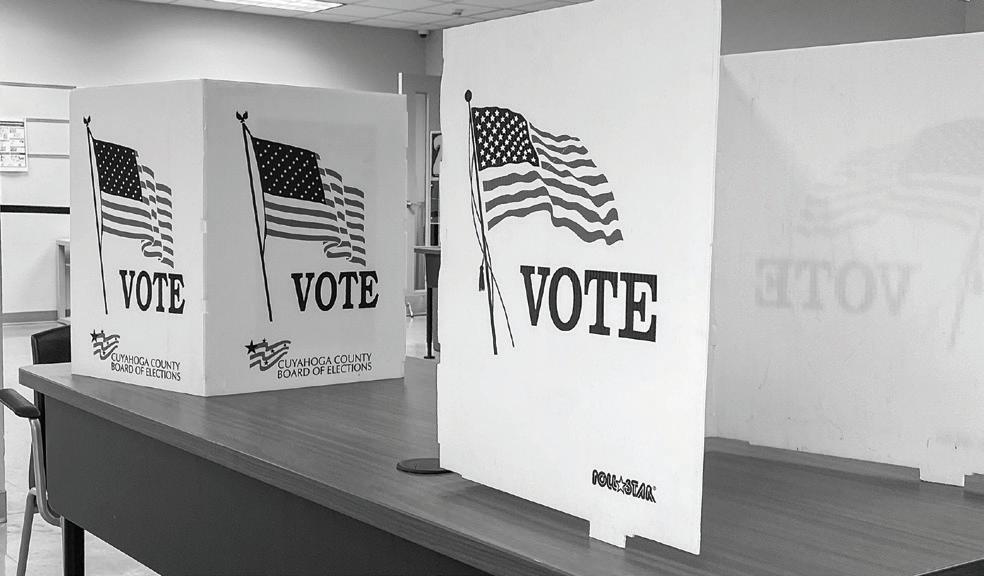
House Bill 458 requires proof of identification for inperson voting and places other restrictions on mail-in voting. The bill was signed into law in January 2022 by Governor Mike DeWine.
Valid IDs voters can show include an Ohio driver’s license, an Ohio State ID, a temporary ID issued by the Bureau of Motor Vehicles, a military ID or a U.S. passport. Voters will not be able to present a driver’s license from any state other than Ohio.
The bill also includes a provision that makes obtaining a state-issued ID free of charge. However, if an out-ofstate college student chooses to acquire a state-issued ID, this would invalidate their out-ofstate driver’s license.
According to statistics from the common data set of Baldwin Wallace University students on bw.edu, over onein-five undergraduate students at BW come from out of state.
In a report conducted by
the University of Maryland’s Center for Democracy and Civic Engagement, it was found that 24 percent of people aged 18-29 do not have driver’s license, and 3.1 million Americans aged 18-29 lacked any up-to-date governmentissued photo ID.
Maryland’s Center for Democracy and Civic Engagement also found that Black Americans are more than two times less likely to have a government-issued photo ID compared to white Americans. After the North Carolina legislature rushed a bill in 2018 that included a similar provision requiring photo ID 2018, the law was struck down in the state Supreme Court after a judge ruled that the law unfairly discriminated against Black Americans.
“The provisions enacted … were formulated with an impermissible intent to discriminate against African American voters in relation of the North Carolina Constitution,” Associate Justice Anita Earls wrote in the Court’s majority opinion.
Bride Rose Sweeney, the Democratic Ohio State Representative representing Berea, voted against the bill and said that she was thinking of college students and Black Ohioans when she made her decision.
“The vast majority of my colleagues do not care about young people because they do not feel that they are the electoral vote,” Sweeney said. “And we often make choices that go against a vast majority of what young people want in the state, and this is continual
evidence as to why they would put forward something that so specifically targets, not just young people but young people that are getting an education.”
HB 458 was created because of fears regarding election integrity, but Sweeney said it is not a valid reason.
The Secretary of State Frank LaRose’s office identified fewer than 30 “potentially illegal” votes. Still, Ohio State Senator Jerry Cirino (R-Kirtland), who was a cosponsor of HB 458, said that the bill is a preventative measure for election fraud.
“We don’t have to wait to have election fraud in order to put steps in place to make sure it never happens and that’s what this [HB 458] is,” Cirino said.
Sweeney said that most
students do not have a permanent address and that they should be able to vote where they live.
“If you’re a student at Baldwin Wallace and you want to vote in that location because that’s where you’re living, you can,” Sweeney said. “If you want to say where you’re living is back home in Pennsylvania, and you want to go there, you have that choice. That’s how it works, and nobody should be telling students they should or should not be able to vote if they so choose.”
On the other hand, Cirino said that the bill makes it so that students cannot “have it both ways.”
“You have to decide where your residency is. That’s what governs where you vote,” Cirino said.
While Ohioans only need to show proof of identification if they are voting in person, the law also introduced changes to how a person could vote through mail-in-ballots and early voting.
These provisions include only allowing one ballot drop box per county, limiting the time to request absentee ballots to a week before Election Day, making the Monday prior to election day the last day for early voting and limiting the number of days that the County Board of Elections can receive absentee ballots up to four days after the election.
Jackets Engaged, a nonpartisan political engagement team affiliated with the Brain Center for Community Engagement usually collects absentee ballots in the basement of the student union in Strosacker Hall.
Hannah Dodson, sophomore neuroscience major and the co-student director of Jackets Engaged, said that social media has made our generation more inclined to the immediacy of in-person voting as opposed to voting through an absentee ballot.
“[Our generation doesn’t] really do early voting because they want to go on Election Day and see that immediacy of being able to vote and boom and you’re done,” Dodson said. “And it’s always hyped up, but early voting and mail-in voting has very little say in the media.”
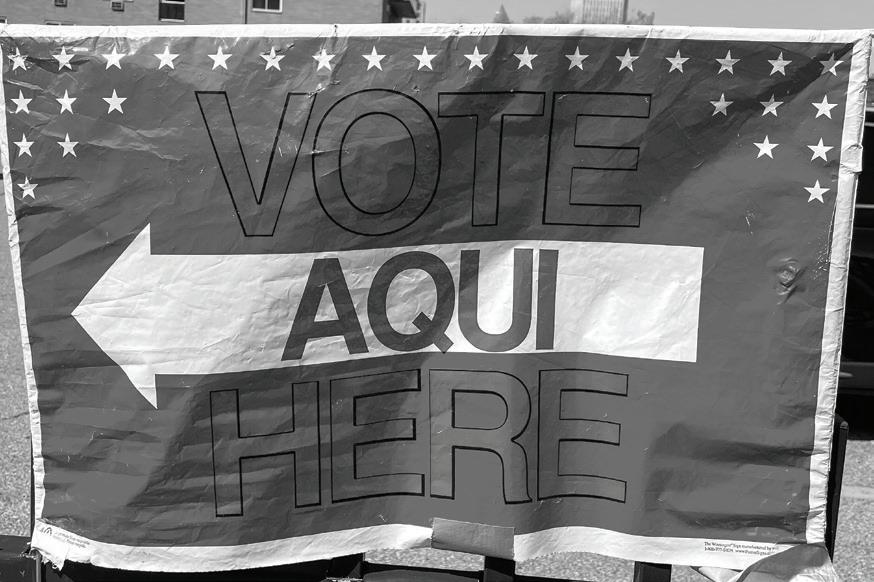
Following the changes made in the 2021-22 academic year which moved the experiential learning requirement from the core to a general graduation requirement, more changes will be implemented in this upcoming summer to streamline the process for completion and to provide the students with more opportunities to have multiple EXP courses on their transcript.
Christie Shrefler, director of the Center for Global Exploration, said that the main
goal of the change was to make the process simpler and more equitable for students across campus.
“In the past, students had to complete several forms before the experience, find an EXP mentor, and then complete an evaluation and write an essay at the end,” Shrefler said. “Beginning this summer, students will be registered for a specific EXP section like EXP 300 internships or EXP 300 Study Abroad and then complete a survey at the end of the experience to help them reflect and guide them through the outcomes.”
Once enrolled in the designated course, students
will fall under a particular staff or faculty member instead of being required to find a faculty mentor for their experience. Shrefler is the faculty member for study abroad. Laura Hopkins, an assistant professor of public health and prevention science, is the faculty for the students handling research.
Patti O’Grady, the director for orientation and new student programs, is handling experiential leadership.
Marsita Ferguson, the interim director for the David & Frances Brain Center for Community Engagement, is handling service, and Dominique Edmonds, the internship & recruiting
coordinator, is the faculty member for students using an internship to fulfill their EXP credits.
While the process will be slightly different with the changes, students will still have the same options to complete the credit needed for graduation. These include completing any course with a designated X or S attached to the course number or participating in a study abroad, service, leadership, research or internship opportunity. Additionally, students now have the option to ‘stack’ their EXP credits, allowing multiple EXP courses to appear on their transcript throughout
their time at BW. Shrefler said that while students may not need the credit, having multiple EXP credits on their transcript can be beneficial for post-graduation.
“The more experiential learning [the students] do, the better their BW story becomes,” Shrefler said. “That story will help them get jobs, get into grad school, or simply help them figure out how to do hard things in the future.”
The new process will pilot in the summer, and Shrefler hopes that it will allow more students to complete more experiences throughout their time at BW and treat them as more than just a graduation
Changes are on the horizon for BWTV as it pairs up with Baldwin Wallace University's esports team in Fall 2023.
After being slowed down by the pandemic, BWTV has students back on their feet developing their production abilities as it aims to establish a new era for the program.
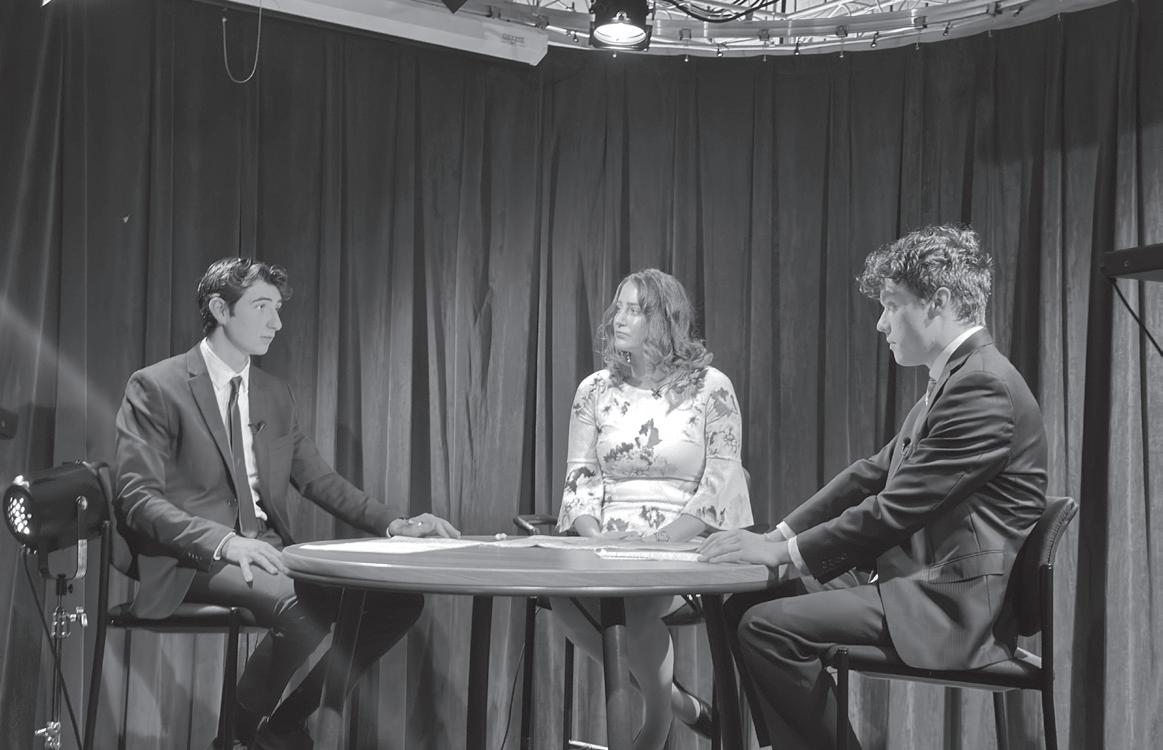
BWTV is a student-led program that aims to help students build important skills in broadcast television and video production. For many years, due to the challenges posed by Covid-19, students did not have the opportunity to experience the process of professional video production.
A chat with the leading professor of the program,
associate professor in the Department of Communication Arts & Sciences, Duane Battle, said that one new initiative would see BWTV collaborating with BW’s esports group, led by Jake Grasso.
“[Grasso] wanted to connect and do a live show with esports, similar to what you’d see on ESPN where you would have commentary over live gameplay,” Battle said.
Battle said that this would be a great opportunity for students to cover something in a professional format.
“TV production is all the same whether it be award shows, game shows, live sports or esports; the only difference is the subject may be different,” Battle said.
Battle said it is important to work up the video production
muscles to attenuate students to the pace needed for the professional world.
“Making sure you’re fast and accurate [is] very important,” Battle said. “That’s the biggest difference with a professional workplace and a student one, as everyone is already great at their craft.”
As it stands, BWTV is more based on individual work than it has been in previous years as students work individually on their projects rather than as a team.
Joe Tarantowski, professor of film studies, said BWTV has a long history on campus.
Tarantowski was hired in the 1990s to produce a show called Studio 2 — the original BWTV — which aired on local public access television.
After a few years, Molly Swiger, professor of film
studies, took over the show and dealt with documentaries, interviews, sports and other broadcasts.
“Local access television has disappeared and the outlet to it doesn’t exist anymore, Tarantowski said. “The radio station streams online, and The Exponent publishes online, but I don’t know if it’s been a choice to not do anything with the new program publicly.”
Tarantowski said that BWTV has changed and evolved over its history.
“Is it a sports show, a documentary, a game show? It doesn’t necessarily stick to one thing,” Tarantowski said.
Although the program is intended to sharpen a film and media production major’s skills, it is open to students of all majors who are interested
requirement.
“I hope students, faculty, and staff find that the process is simpler and that we get campus-wide buy-in that students should be doing more and tracking it. We also hope that this change will help students recognize the value of experiential learning,” Shrefler said. “Rather than this being a graduation requirement, this is an opportunity to acquire new skills, promote self-awareness, develop more empathy, engage in their community and so much more.”

Apple TV+ hosted a virtual Q&A event about its new show “Extrapolations” for college students around the country on April 18. Scott
Z. Burns, the show’s creator and executive producer, spoke alongside Dorothy Fortenberry, another executive producer on the show, to give students a deeper look into the new series.
“Extrapolations” tells the story of the effect climate change will have on the planet over the span of three decades. Told as an anthology, the show depicts the interconnected stories of people along different points of the three decade timeline throughout the course of
eight episodes.
“Our show wanted to have the pulse of a thriller,” Burns said. “We wanted to move across time and create a very basic question for the viewer, which is ‘Will we solve climate [change] before it solves us?’”
Burns said that after working on “An Inconvenient Truth,” a documentary about Al Gore’s global warming education campaign, he became interested in how he could tell the story around climate through a narrative lens rather than through documentary.
At the same time that Burns was working on the storyline for the second episode on the possible extinction of humpback whales, he was also saying goodbye to one of his parents. Burns said that because of this, grief became an important undertone in
the show.
“[The episode] became sort of a metaphor for grief, and what it means to be in a world where you’re saying goodbye a lot of the time,” Burns said. “And how does that change human beings?”
Grief was not the only undertone that worked its way into the show though, as religion was also a theme that was explored in the series. According to Burns, the show relies on “an appeal to higher power,” so having religion underscore certain episodes fit well within the show’s message.
Stories of natural disasters are frequent in the Bible, Fortenberry said, as in the Bible, God sends natural disasters in response to sin. When the first disaster does not stop sin, God often sends another natural disaster.
“I think the idea that people would look around and see these natural disasters and see the hand of God makes a ton of sense,” Fortenberry said. “It’s a very ancient impulse to consider how our actions have brought upon the wrath of the natural world.”
According to Burns, as the series progresses through each episode, the characters start to lose their human connection and community solidarity as they retreat further into the advancing technology that encourages them to escape the climate disaster rather than trying to fix it.
This technology inspires a willingness to give up, Burns said, as the alternative reality and virtual reality technology makes the characters, especially Hari Nef’s character in Episode 7, care less about
what is happening with the outside world.
“This person is so disenfranchised that they would actually rather leave and bet on a possibility than take up arms and try to improve their current situation,” Burns said.
Despite exploring dark and depressing themes in each episode of the show, “Extrapolations” also has its fair share of comedy throughout. Fortenberry said that this is by design, as the use of comedy makes the audience aware that even though the state of the world may seem alright in the moment, the effects of climate change are still present.
“[Climate change] is already happening, and all of us at some point today will laugh about something,” Fortenberry said. “Climate
change feels like right now. There are moments that are going to make you angry, there are moments that are going to make you sad, and there are moments that are going to make you laugh.” Although there is no season two confirmed for “Extrapolations,” Burns said one of the things he would like to explore in a second season would be the complexity of solutions for climate change in addition to continuing the stories of some of the characters featured in season one.
All eight episodes of “Extrapolations” are now available to watch on Apple TV+.
By STEFFI BURDICK Contributing WriterThe Baldwin Wallace University Community Arts School, along with other campus affiliated programs, offers music lessons and ensembles for learners of all ages.
The Community Arts School is located on campus at 49 Seminary St., and it is open for ensembles and music lessons on weekday evenings and Saturdays.
Carol Ross, a Community Arts School violin, viola and Suzuki program instructor, teaches around 20 students at the Conservatory three days a week. She said that she thinks her students and their families enjoy coming to campus.
“I think families like the idea of coming into a conservatory building where there are college students and professional musicians working and teaching and learning,” Ross said.
Caroline Niederhausen, firstyear music education and trumpet performance major at the University of Cincinnati, said she was involved in many of Community Arts School music programs such as lessons, a wind ensemble and a camp. She enjoyed and appreciated all the opportunities available before college.
The Community Arts School offers lessons to people of all ages. Ross said she teaches kindergarten through 12th-grade students, but the Community Arts school has classes for infants through adults.
“There’s things for younger kids, and we have adults who are taking lessons too, so it truly becomes a whole community of people,” Ross said.
Kym Cleal, a first-year music education major with a voice primary, currently interns for the Community Arts School Women’s Chorus. She said the role of the program is essential to build the BW community, and as an intern, she has been able to see and help older community members and some high school students.
Outside the Community Arts School, other music events and opportunities take place on campus, such as masterclasses and adjudicated events.
Cleal attended a masterclass at BW with her high school’s acapella choir during her senior year. They performed one of their pieces and received feedback from music education students. She called it “a cool experience.”
On March 11, the National Federation of Music Clubs held a piano adjudicated event at the Conservatory. Katie Ayers attended as her son performed at the event for the first time.
“We had never been there before.
… [It] was cool for him to see what a college campus looks like,” Ayers said.
Ayers, Cleal, Niederhausen and Ross said that BW’s music programs and events are a valuable addition to campus.
Ross said these programs are valuable because of the skills students learn with their education. In addition to learning their instruments, they learn how to work with others and “persevere when things get hard.”
“It’s important to the community at large that students are here learning to make music, and learning about the arts, and
encouraging that education. … [The arts] are so important,” Ross said.
Many of those involved in these music programs have found that they provide a lasting impression and great learning experiences for young musicians.
“You can kind of get the sense of what you might want to do after school,” Ayers said. “Those kinds of experiences do leave impressions.”
Niederhausen said that the BW programs she was involved in influenced her choice to pursue music “a thousand percent.” She said they enhanced her trumpet skills and built her endurance for her long practice hours in college.
“At the camps, we practiced a lot in a day, and it was a lot for me, but it made me more prepared for when I came [to college] and practice four or five hours a day,” Niederhausen said. “I’m very thankful for what BW did for me, and it definitely helps me with where I am today.”
Cleal said that the masterclass was so “hands-on,” and the feedback from the BW students showed the connections from what they learned in classes. She said that attending this masterclass also allowed her to see the BW community, influencing her decision to come here.
“After we did the masterclass, we ended up getting lunch at the Union, and everyone was so nice,” Cleal said. “I definitely came here because of the community, and I stand by that to this day.”
performed, the agents checked the names of those they were interested in working with.
“The goal is that everybody comes home with an agent and maybe even has gone in Continued from page 1 for some Broadway shows,” said Suranj prior to the event. “Maybe some people have booked something, which has happened in the past,” In addition to the Showcase, BWMT seniors also performed a concert at 54 Below, a famed cabaret-style restaurant and performance space, with notable BW alumni Matthew Frederick Harris, Marcus M. Martin and Veronica Otim on April 16 at 7 p.m.
“I think that my class has just worked so hard over the past few years. And it's just been really exciting to see all of the work paying off with all of us because at this point, it's a lot more of a collaboration with [music theatre program director Victoria Bussert] and a lot less of … an expectation,” Moyer said.
After months of preparation, BWMT performed their showcase for family and friends on April 2 in Kleist Center for Art & Drama. They were then ready to take their showcase to New York City and get one step closer to their dreams.
“I mean, because I've dreamed of being on Broadway since I was 12, and the fact that this is now becoming a tangible thing that feels within reach and is something that I can see steps towards getting is unbelievable to me. It makes me feel so lucky,” Surani said.
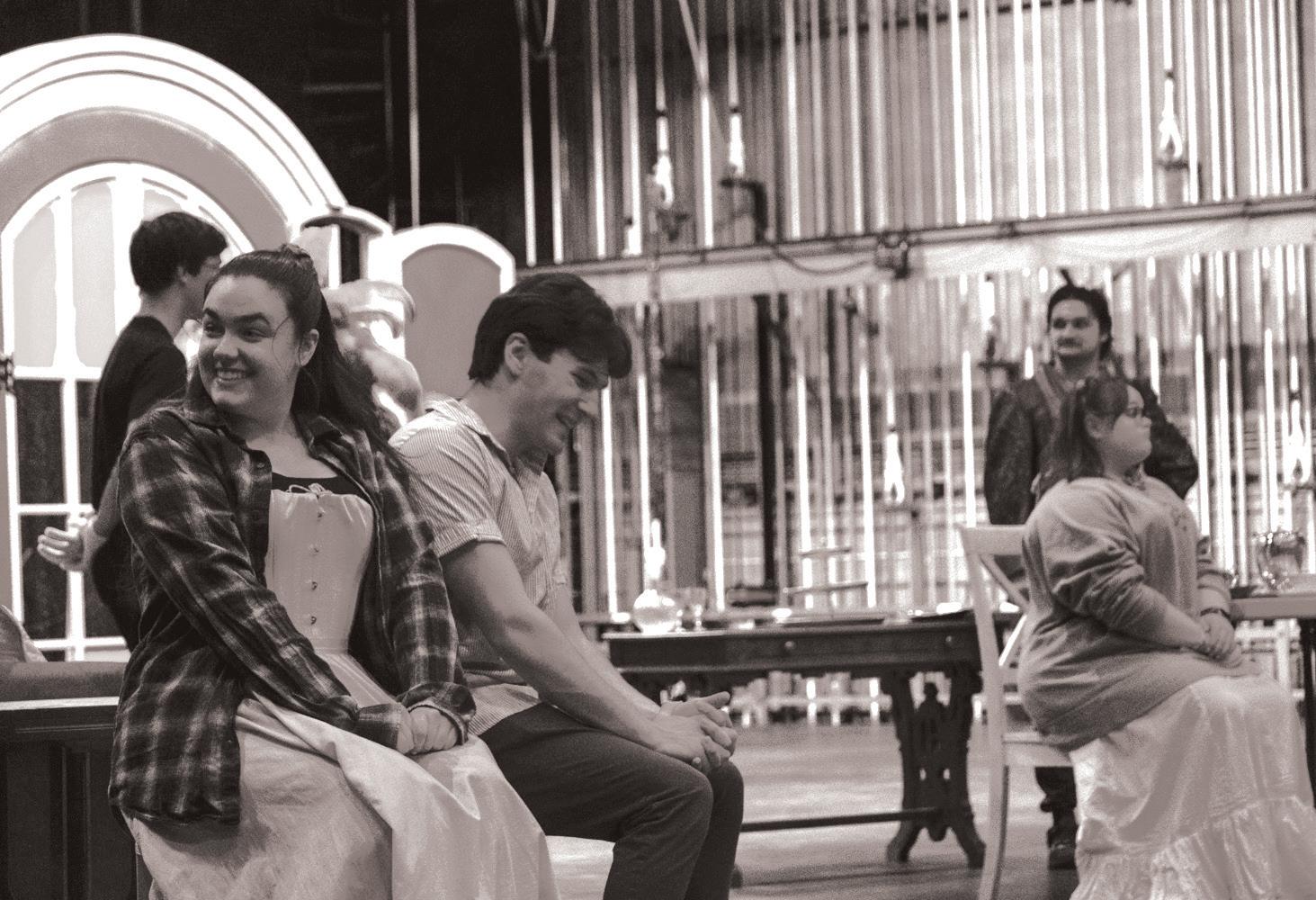
BWMT: Seniors hope culminating performances lead to professional roles
University program provides community members of all ages with opportunities for artistic growthThe BW Theatre and Dance department put on Oscar Wilde’s 19th century satirical comedy “The Importance of Being Earnest” on April 19-23 at Kleist’s Mainstage Theatre. Read the full story at bwexponent.com/earnest By ELLA YORK Staff Writer
Theatre and dance students are expressing their frustration after Heidi Harris, a lecturer of voice in the department, was denied a tenure-track position in favor of an external candidate.
Harris, who has been teaching at the University for five years, will lose the majority of her classes as a result of this decision.
Harris said that, as of now, she will not be teaching any classes in the theatre and dance department during the fall semester and may be slated to teach one or two courses in the Conservatory of Music.
“Part of the reason that I applied for that [tenuretrack] job was that I need a full-time job; I need benefits.” Harris said. “I may have to change tracks altogether and find something outside of theatre education to make sure that I can keep paying my bills.”
In light of this decision, theatre and dance students have constructed a bulletin board full of letters and cards showing their love and support for Harris outside of her office.
“I was just overwhelmed by the outpouring,” Harris
said. “I hadn’t expected that because anywhere I’ve ever worked, not just as a teacher but anywhere, I’ve never felt so seen by my students and yet so invisible to my colleagues and the administration.”
Rachel Gold, a senior BFA acting major, said that Harris was “pivotal” in creating the voice and dialect curriculum and was the sole voice professor for many years. In addition, Harris also created the standardized patient program, a program where acting students can earn money by acting as a patient for which medical students can practice.
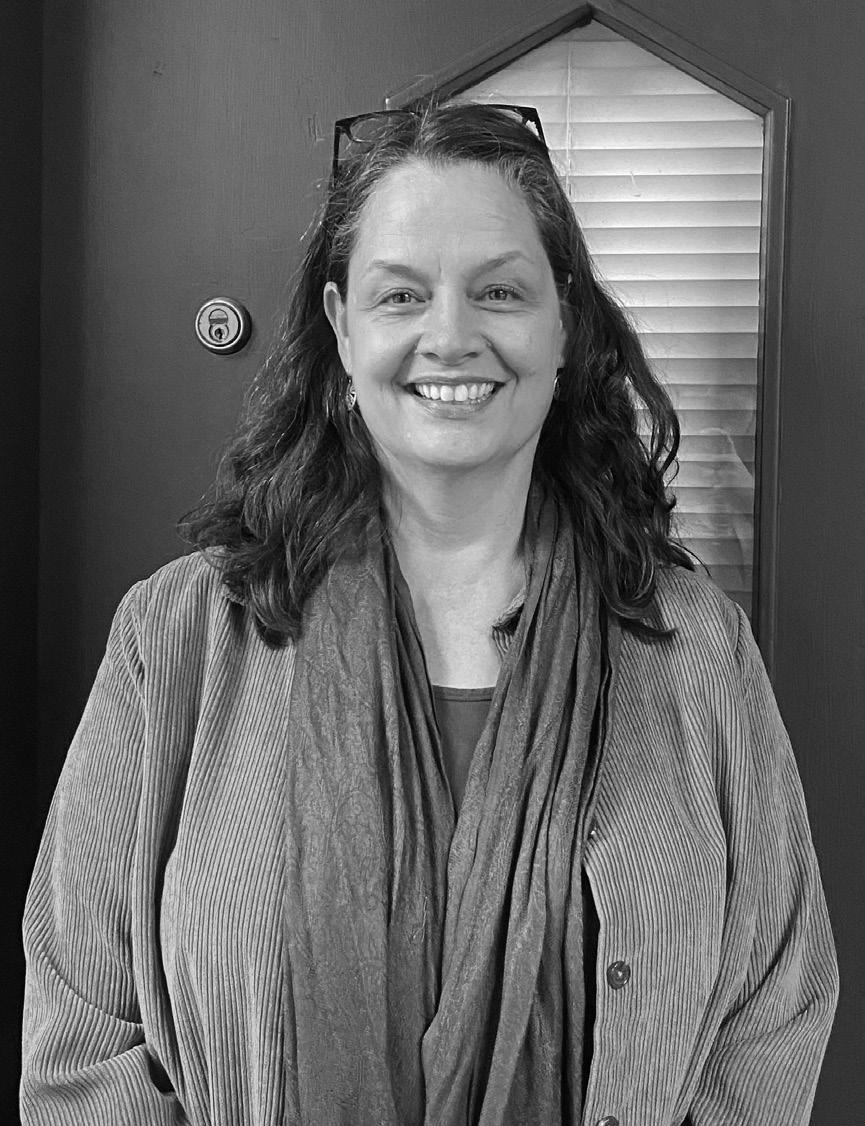
Harris has also brought the Radio on the Lake program to BW, Gold said, a radio play company where students can participate in acting in radio plays or directing them through the directing mentorship program with the company.
“We got professional educational directing experience because of Heidi, because of that program she brought,” Gold said. “She bridged that gap between the professional world and the educational world and got us experience in the field that we want to transition into post-graduation.”
Gold said that students within the BFA acting
majors, BA acting and directing majors, and stage managers wrote letters supporting Harris in getting the tenure-track position. They were then told the decision had been passed to the committee deciding on the tenure-track position.
“It really feels as though the university doesn’t care about their students because they’re not listening to their voices,” Gold said. “They’re just not listening to us.”
Julia Cooke, a senior acting and directing major, said that the department had lost four professors in the past year, with at least one professor, Anjanette Hall, leaving after being denied a higher position.
“Our department has seen a lot of upheaval in the past year, and so that’s another reason students have been saddened by this news,” Cooke said. “Instead of having a constant figure we can rely on, it’s someone else
new.” When professors leave the department, the opportunities they bring with them leave too, Gold said. For example, Gold said that when Laura Welsh Berg left the theatre department, the master classes and Great Lakes Theater internship that she had brought were no longer affiliated with the school.
B y KATIE DAVIS, CALEB BLAZEK & STEPHANIE FORYAN
Trading out the professors teaching the classes also interferes with the curriculum students are learning, Gold said, who has seen a complete change in the curriculum during her time at BW. These frequent changes can interfere with the registrar’s records.
“All of the seniors in the BFA got emails this year that stated we wouldn’t be able to graduate because they had a different record than what the school has, what the department has,” Gold said. “All of those credits were waived for us, but that’s just one more example of the miscommunication in this university.”
Ruah Uhlman, a junior BFA acting major, echoed this sentiment and said that having a new professor take over the voice curriculum would significantly impact the underclassmen currently on the voice track.
“They’ve created a curriculum where there’s four semesters of one vocal
technique, and you learn it in a specific order, and to interrupt that is just going to be a loss of learning for those students,” Ulhman said.
Ulhman said that she believes Harris deserved the position because of her level of knowledge, her care for her students and her credibility as a professional.
“She picked up a lot of the slack from the rest of the department and has filled in many gaps this year and years before,” Ulhman said.
Cooke said that Harris has gone beyond what is in her job description to bring theatre students opportunities because she cares.
“She creates an incredibly safe environment for her students so that we feel free to ask questions, and she always gives genuine answers,” Cooke said. “She’s interested in our experiences and our discoveries, and that feels good as a student.”
Harris said she would like to thank her students for valuing her and her work, and she is happy to have been a part of their journey in life.
“We need to feel valued and appreciated, and my students have always given me that here at BW. And for that, I’m eternally grateful,” Harris said.
INSTRUCTIONS: Fill in the answers on the blank spaces with the help of the clues. The write those letters in the grid to reveal a quote. Black squares indicate the end of a word, and punctuation has been removed. When you're done, the first letters of the answers to the clues will be the author and subject of the quote.


'I've never felt so seen by my students yet so invisible to my collegeagues and the administration':Alex Minyard, The Exponent Students made their frustration known after theatre and dance instructor Heidi Harris, pictured in last November, was passed over for a tenure-track position in the department.
"A wizard is never late, Frodo Baggins, nor is he early. He arrives precisely when he means to.” - Gandalf the Grey
The Exponent is proud to present our first annual Best of Berea Awards. These awards were voted on by our readers and are meant to celebrate our favorite things about living in Berea and attending Baldwin Wallace University. A full list of nominees for each category can be found at bwexponent.com/2023awards. Winners and nominees will be celebrated at The Exponent’s 110th Anniversary Gala on April 29 — see page 11 for more details.
Best Musical Theatre Performance
"The Wild Party" *
"Ghost the Musical"
"The Sound of Music with The Cleveland Orchestra"
"Bare"
Best Theatrical Performance
"Detroit '67" *
"Fyoo zh en"
"The Nether"
"Dread Fascination"
"The Burial at Thebes"
Best Student-Run Production
"Rocky Horror" *
"Julius Caesar"
"Stop Kiss"
"Misfits"
"24 Hour Theatre Project"
Best Way to Spend a Meal Swipe
Starbucks *
Boss Chick n Beer
Colony Cafe

Domino's Pizza
Lang Dining Hall
Best Study Spot
Knowlton Center *
Ritter Library
Café Ah-Roma
Berea Public Library

Starbucks
Best New Student Organization
ASL Club *
Asian Student Alliance
Book Jackets
Printmaking Club
Best Residence Hall
Front Street *
North Hall
Carmel Center
Davidson Commons
Amelia Harding House
Lang Hall
The winners of the following awards received a majority of write-in submissions from The Exponent readers:
Best BW Varsity Sports Team - Women's basketball
Best Sports Moment- Swim team perseveres
through bus crash to compete in meet at Notre Dame College
Best Conservatory Performance - "Pirates of Penzance" by BW Voice Performance
Outstanding Student Organization - Theatre
Arts and Performance (TAP)
Outstanding Faculty Member - Heidi Harris
The Dorothy Hummel Award - Nelia Rose Holley
The Dorothy Hummel Award, named for The Exponent's first female editor-in-chief is given to a student who has broken barriers for women on campus.


Best Coffee
Starbucks *
Café Ah-Roma
La Crepe
Dunkin'
Best Dessert/Baked
Good
Igloo Frozen Yogurt *
Spudnuts
Three Girls Cupcake Shoppe
Best Place to Spend a
Saturday Night
Front St. Social *
Polish Village
Oriole Cafe
Mike's Bar and Grill
Eastland Inn
Best Local Business
The Shoppe *
Kidforce Collectables
Luna Team Shop
Three Girls Cupcake
Shoppe

Best New Business
El Torito Tacos *
Rock City E-Bikes
Gar and Mar
Best International Cuisine
Maya *
Nam Wah
Gar & Mar
Sweet Mango
El Torito Tacos
Best Place to Spend Your 21st Birthday
Front St. Social *
Eastland Inn
Polish Village
Oriole Cafe
Tony K's
Best Place to Take Your Parents
Mike's Bar and Grill *
Best Breakfast
La Crepé
Café Ah-Roma
Spudnuts
Grindstone Tap House
Perk Cup Café & Grille
Best Bar Food
Boss Chick n Beer *
Mike's Bar and Grill
Cornerstone Brewing Company
Oriole Cafe
Grindstone Tap House
* Denotes winner of each category
On March 15, a survey was sent out by a group of Baldwin Wallace University sustainability students to ask the student body how the city of Berea could improve transportation infrastructure for bicyclists.
This survey was part of a combined effort between participating sustainability students and the city of Berea to prepare for a study to be conducted by the Northeast Ohio Areawide Coordinating Agency to see what aspects of transportation infrastructure can be revamped in Downtown Berea.
Ward 3 Berea City Councilwoman Erika Coble, a BW sustainability alumna who currently represents most of BW, said that this study could lead to many improvements for transportation across campus and beyond.
“It started when I invited some speakers to talk on the
local waterways,” Coble said. “Some of the sustainability students came to this talk, and we started discussing ways to work together on future sustainability projects. I knew about the upcoming NOACA study, so that’s how this survey took place.”
Coble said that feedback from the students was an important aspect of the research gathering.
“We wanted to be sure that the people of NOACA had the opinions of the people who actually live here because [the residents] have the experiences that people who are just going to come and look around the city for a couple of weeks aren’t going to have,” Coble said.
The students who took part in the talks to create this survey were sustainability students Olivia Powel and Emma Stamper, while the student who created the survey and sent it out via email to the students of BW was sustainability council member and sustainability major Katie Winkler.
Winkler said that the walkability of the BW campus makes her favor bicycle transportation.
“I’ve always thought BW was one of the most walkable college campuses, as is Berea as a whole,” Winkler said. “You can do a lot just by walking around, you can go get groceries, visit friends, travel around campus. And I think that anything that we can do to promote that walkability and that bike-ability, whether it be improving infrastructure or equipping students to do that on their own, is something that needs to be done.”
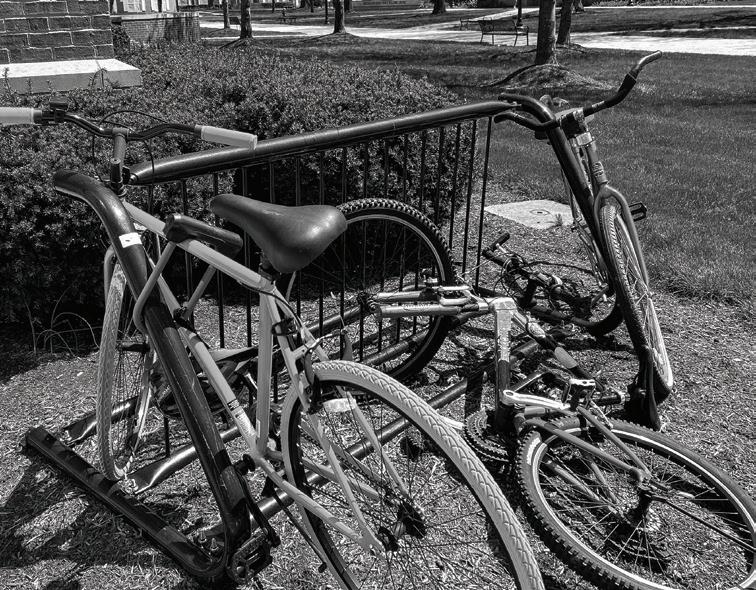
In total, 421 students filled out the survey, giving their opinions on what could be done to improve the campus and city for bicyclists. Students
To the class of 2023: Congrats, grads! To the rest of you, hang in there — you’ll be out of here eventually. But you might as well make the most out of whatever time you have left. We polled our graduating seniors and some other folks around the newsroom and asked them: what should every Baldwin Wallace student do before they graduate? Some answers were given from the heart, others in jest, but they are all examples of tried-and-true BW rites of passage. So here’s our little BW bucket list — see how many you can tick off before you become a Yellow Jacket 4 Life.
–Justin McMullen, Executive Editor1. Join The Exponent. Duh.
provided an array of responses ranging from protection to the rain to bicycle storage.
Winkler said some of the suggestions from the survey included “adding cover to the bike racks so students don’t have to put plastic bags on their seats to protect from rain, installing cameras over some bike racks so students don’t have to worry as much about getting their bikes stolen, building some sort of long term storage for bikes and even building some bike lanes for students to use.”
On March 2, the Governor of Tennessee, Bill Lee, signed Senate Bill 3 into law, the first of its kind that bans public drag performances that could occur in the presence of young children. Similar laws and anti-drag proposals spread to other states, such as Ohio. Members of the BW community and local Cleveland drag performers spoke out against the laws in interviews with The Exponent.
“We have been so progressive that to take a step back, it does not make sense … It is shocking,” said Tobias Yeung, a freshman musical theater major and a part-time drag performer of two years.
Emi Hathcock, president of BW Allies, the studentrun LGBTQ+ campus organization, and senior psychology major with a Spanish minor, said that banning drag also means prohibiting freedom of expression and speech.
Stevie Aura, a drag queen based in Cleveland, said these bills “hyper-focus” on the art form instead of focusing on issues that should take precedence in the country. The performer also said the concern over children attending drag shows may be unwarranted.
“People say ‘kids should not go to drag shows,’ but the kids that go to drag shows
are there with their parents because [the parents] want them to experience drag performances,” Aura said.
Carly Üninemclite, a Cleveland drag queen, has practiced the art form for about seven-and-a-half years. Üninemclite said the ongoing anti-drag efforts are “devastating” and that the legislative climate will harm the transgender community.
“If we listen to people within the transgender community, they will tell you firsthand that these bans are not just to target drag entertainers,” Üninemclite said, “[and] they are meant to encompass transgender individuals just living their everyday lives.”
Ken Schneck, a professor of education at Baldwin Wallace and the editor of The Buckeye Flame, an Ohioan LGBTQ+ publication, said the bill is part of a “larger movement to criminalize the lived experience of LGBTQ+ Americans.”
“Transgender individuals are the core of the LGBTQ+ fight for liberation,” Schneck said. “There are several bills right now that seek to ban the lived experience of trans Ohioans, including the ban of transgender women across grades from Kindergarten to college from participating in athletics and the ban of gender affirmative care in transgender youth to 18 years old.”
Hathcock said the anti-drag bills would affect not just the
adult transgender community but also the children within the LGBTQ+ community.
“It is pretty clear what is going on here … [It is] very anti-LGBTQ+ and very antitransgender,” Hathcock said.
The drag queens also had various perspectives on how the bill has impacted their performances.
Üninemclite said they had not had much personal effect from the bill's results, but their friend and mentor, Randall, has experienced the impact.
Üninemclite said Randall hosts many drag queen story hours and has had an incident where they recieved a threat from an extremist group known as the Proud Boys, where a flyer was leaked on Instagram advertising to “bring your ammo; it is gonna be wild.”
“Thankfully, enough people heard about the protests that were bound to happen. Counterprotests severely outnumbered the extremist group that had shown up. Thankfully, no one got hurt,” Üninemclite said. Performers also gave their definition of drag in their own words.
Yeung said that defining drag is different for everyone, but he would personally describe it as “a way to present yourself as something different from how you present yourself every day.”
“Drag, by definition, can represent so many different things,” Aura said. “It could
2. Ride a rollercoaster at Cedar Point. This is a nonnegotiable must if you come from out of state.
3. Visit the Museum of Contemporary Art. Interesting exhibits are even part of the restrooms and stairways.
4. Venture out to Little Italy and the West Side Market for food and shopping.
5. Hang out at AffoGATO Cat Café. Cats. Do I need to say anything more?
6. Sign up for notifications for Outdoor Adventure Program and YJAB events. Both groups put on some really cool outings, so keep an eye out.
7. Get a library card from the Cuyahoga County Public Library. It doesn’t matter if you are from out of state, or if you have a library card somewhere else. They will give you one.
be impersonating an overthe-top female or an overthe-top male or anything in between.”
Üninemclite said that they define drag as “performative gender.”
“It is a comedy, drama, it is gore … It is a wide variety of genres within a performance style,” Üninemclite said.
Üninemclite said they draw inspiration from the drag queens they have watched on television who have “had something profound to say and wanted the space to say it.”
“There is something so infectious about watching a performer on stage,” Üninemclite said. “You just feel the energy that they are giving.”
Aura provided perspective on overcoming criticism regarding drag performances.
“It is best to walk away and let them feel the way they feel … At the end of the day, their opinion of me will not change what I am doing,” Aura said.
Yeung offered similar advice.
“Ignore it,” Yeung said. “The art [of drag] is a ‘you’ process that is a huge journey.”
8. Try your hand at BOSS Pro-Karting and Axe Throwing. If you’re extra daring, try both at the same time. (Do not tell them we told you this.)

9. Fight with the parking office about a ticket. You might not be able to park anywhere, but at least you have a non-zero chance of stepping in horse excrement on Beech Street.
10. Visit the Berea Falls Scenic Overlook and the Metroparks. Some of the prettiest sights you can see in this county are right in our backyard.
11. Prioritize your mental health! No, really.
12. Watch the daffodils all over campus grow in Spring. It might make the three months of snow worth it.
13. Go to the Solstice Steps and watch the sunset with friends. Or dawn, but who wants to wake up that early?
14. Take a TikTok video of the first snowfall every year. Especially if you’ve never seen snowfall before.
15. Go to the Burrell Observatory when it is open. Words can’t quite describe the feeling of seeing Saturn’s rings with your own eyes for the first time.
16. Join a club. And then quit a club after you realize you joined way too many clubs.
17. Stay up all night finishing that project that you put off. And then do it again after you tell yourself you wouldn’t.
18. See a touring show at Playhouse Square. They’re almost as good as our BWMT performances.
19. Go to Front Street Social.
20. Download a dating app. And promptly delete it.
21. Go to a BW vs. John Carroll football game. You never know, you might even get to see a brawl.
22. Take a ride on the zipline at Coe Lake. Bonus points if it’s too dark to see anything in front of you.
23. Study at Ritter Library on a Friday night. Sure, you could be partying but hey, grind never stops.
on edge and Continued from page 1
Baldwin Wallace University is a predominantly white institution. According to the U.S. Department of Education College Scorecard, almost 80 percent of the student body is white, while 21 percent are students of color. Which leads me to wonder if BW’s lack of diversity has any effect on its current students.
With clubs like Black Student Alliance, Spanish and Latinx Student Association and the newly formed Asian Student Alliance, there are many pockets where minority students can find community. BSA even has their own house on campus, where students can go any day to unwind or hold events.
Liana González, a sophomore political science student, said that her transition to BW would have been a lot more difficult without SALSA.
“It would’ve been a lot more isolating,” González said. “Just because with how many people come through to meetings, I at least know one other person in all
my classes.”
González said she went to every meeting and event that SALSA had in her first year.
“I wanted to be able to actually have some Hispanic friends on campus … because that’s not something I really had in high school,” González said.
González went on to share stories of small microaggressions she has faced on campus, and within SALSA she has a safe space to talk about those experiences.
In contrast, junior Halle Vargo, an art education major, feels that lack of representation has not truly affected her experience.
Originally a transfer student, Vargo found that being a mixedrace student was almost nowhere on her mind at the time she committed to BW and was more concerned with the programs we had to offer.
Ironically, Vargo felt that any isolation she felt from the University had nothing to do with her ethnic background, and more to do with her Hashimoto’s disease.
“The only time I would [feel isolated] is not like race-wise. It's more like sick-wise,” Vargo said.
Vargo found that getting
adequate accommodations for her disease was very difficult.
A quarter Korean, Vargo feels that she fits in well with the demographic at BW as well as at her sorority. Though with the creation of ASA, there may be room to explore some other parts of her she feels she cannot explore daily.
“Well for part of me there’s some things that people don’t get,” Vargo said.
The amenities available to students of color seem to be doing the exact work they were put in place to do, though there is always room for improvement.
“I think listening to what students of color actually want in terms of community building opportunities [is key],” González said. “SALSA would love a place to call their own.”
When there are places like historically Black colleges and universities available for students of color to choose, the fact that students chose to be Yellow Jackets puts the responsibility on Baldwin Wallace University to make sure that every person can have the best possible experience available, no matter their background.
The women of the Baldwin Wallace rugby team have found the balance between competition and schooling within the club sport while looking to the future for growth.

Varsity sports may demand a certain amount of commitment from their student-athletes, but club sports allow student-athletes the same benefits of varsity sports except in a more relaxed environment. Hanna LeMaster, a sophomore middle childhood education major and former member of the varsity tennis team on campus said that she enjoys the more relaxing environment of club sports. Lemaster said that it compliments her college experience while letting her focus on her education.
Sarah Menke, a junior neuroscience major and executive board member for the rugby team, said that both the practice schedule of practicing at the end of the day along with making sure to leave for their games on game day has given her ample time to complete her homework assignments. She said that with those factors, she has never had to miss a class.
“We don’t have the same time constraint,” Menke said. “We take it as seriously, but we also have more flexibility with our schedule, so it works out well.”
Nontheless, rugby team member
Isabella Fredirsken, a junior business and healthcare major and former track member, said that there is still the opportunity to put in the work.
“I’m still just as sore, I’m still putting in just as much effort, it’s still just as competitive, [but] it’s just an easier schedule to work with,” Fredriksen said.
Being a club sport, rugby receives its budget for travel and staff needed for gamedays from BW Campus Recreation, an entity within Lou Higgins Recreation Center that provides opportunities for open recreation, intramural sports, club sports and outdoor adventures, instead of how varsity sports receive funding from the university and athletics.
Terrel Hicks, the graduate rugby assistant for club sports, said that Campus Recreation provides various functions for their club.
“Campus Rec has helped provide bussing and administration help for the club,” Hicks said. “We help buy equipment and provide practice
not actually safer,” Shields said.
Gary Black, director of Safety and Security, said that the BPD performs various functions for the University.
“[BPD is] here a lot, they work in addition to their normal patrols, but they do extra things too. They work sporting events, special details and other stuff in addition to to their normal patrols” Black said.
According to Black, the close relationship allows campus safety and security the opportunity to communicate with the Berea PD quickly in case of emergencies.
“If we have a person on campus that might be exhibiting mental health issues, intoxicated people, trespassers, or any number of situations, we [will] call [BPD],” Black said.
Black said that the BW campus is a “safe place” and those things do not happen often, but he sees the relationship between the police and Safety and Security as an opportunity to improve campus safety. When an issue does come up, there are benefits to having a quick connection to the police, Black said.
Other students such Maya Norman, the Black Girls Rock chair of the Black Student Alliance campus organization, said that while the close relationship between BW and the Berea PD is strange, they ultimately do not mind it.
“When I think of the Berea Police or Safety and Security, it’s more like ‘Who’s giving me this parking ticket?’ rather than, ‘These people are going to help me with my safety,’” Norman said.
Norman said that she finds that
the extra security officers deal mostly with trivial matters but can provide a little extra comfort and piece of mind. However, she said that a strong police presence at nighttime can prompt slight unease.
“When I’m in rehearsals or in my dorm building, especially late at night during rehersalts, it is weird to see them walking through there,” Norman said.
Norman said seeing the police makes her wonder what is wrong or why they are there, but beyond that, she does not have many interactions with the police on campus.
In addition to the safety benefits, Berea Chief of Police Dan Clarke believes that the strong relationship with the BW campus gives them the opportunity to get to know the students in the community and work on different programs with the school.
Clarke said he had the opportunity to work on the MLK week programing with Erika Walker Smith and Xaiver Harkness and consistently works closely with President Bob Helmer.
“I think I’ve learned that maybe I can’t affect change on a federal level, or the state level, but I think communities are where it starts,” Clarke said.
CLASSIFIED:
Summer employment at Chautauqua
Institution summer resort. Students needed in hotel for dining service, housekeeping & kitchen assistants. Room and meals provided. June till August. For information, email: Lodgingatchautauqua@gmail.com, or call Stephanie at 205-617-8774 or Richard at 954-901-8241
During the college football offseason, each team is allowed time to have organized workouts and practices. In Ohio during the early spring months, holding these practices can be difficult due to the weather. However, when you have a state-of-the-art professional facility right down the road it can make it much easier.
spoke highly of the opportunity to practice in a professional environment.
“Not only is it cool to be able to practice where the pros do but it’s also much better than being out in the cold at six in the morning,” Barnett said.
The team has been able to practice at the Browns facility in the past, but due to the pandemic it has not been allowed for spring ball since 2019.
facilities as well. We have now hired a part time trainer, so there will be athletic training for club sports athletes.”
Hicks said that when looking to the future for places of improvement, they may need help from the athletic department and the University to provide them with a larger budget.
“There are many schools that do this already, and it works. Their teams are very successful, and because it would still be a club sport they could provide athletic scholarships and still have less liability than it being a varsity sport. That would be the next step. But at that point, one might argue that it might as well be a varsity-level sport,” Hicks said.
The Baldwin Wallace football team has the luxury of being neighbors with an NFL team, the Cleveland Browns. Instead of holding their practices outside in the early morning on Tuesdays and Thursdays, BW has been granted access to use the Browns indoor facility in the afternoons.
Head Coach Jim Hilvert praised the team's relationship with the Browns.
“It’s great to not only use this for our team but to be able to create a good relationship with the Browns,” Hilvert said.
Hilvert also said that being able to practice in the facility brings a different type of excitement and convenience to spring football.
Junior linebacker Jack Barnett
For the most part, none of the players on the team had practiced in the Browns facility before the spring. First-year defensive lineman Landon Hare said that eventually, the novelty of the opportunity wears off.
“It’s definitely something that is once in a lifetime, but after a while you get used to it and you see it as just another football field.”
The Yellow Jacket football team, which ended the 2022 season with a 7-3 record, still must go through the rest of spring football and summer workouts and practices before the season gets underway. BW will open its season at George Finne Stadium on Sept. 2 against Mount St. Joseph University.
Thursday, April 27
At the Ovation Festival this year, first-year students have been given the opportunity to reflect on their connection to Baldwin Wallace University through Photovoice.

Developed by Caroline Wang and Mary Ann Burris in 1997, Photovoice is a research method that allows participants to reflect meaningfully on images, which can be used to collect data on a specific topic.
Claudine Grunenwald Kirschner, director of first-year and second-year experience, said that the three main goals of Photovoice, as described by Wang and Burris, are to “enable people to record and reflect, to have some dialogue and knowledge about these issues, and then to ultimately reach policymakers.”
Grunenwald Kirschner attended two conferences last year, one being academicfocused and the other being student affairs-focused. Both had presentations about Photovoice as a unique
research method. Seeing this method used in both realms strengthened her belief that this would be an interesting way to engage first-year students.
“By using the theme of connection, we can collect some insight about how firstyear students are connecting,” Grunenwald Kirschner said. “By having a display at Ovation, there is this dialogue aspect. People are going and viewing the images, they’re reading the written reflections, they’re taking in information and maybe thinking
about things differently.”
Grunenwald Kirschner said that she hopes first-years take this as an opportunity to pause and reflect on their year by looking at the images they have captured. The data collected through Photovoice will then inform the university about what the first-year experience looks like from the perspective of the participants. In a world surrounded by images and social media, Photovoice allows for pause and reflection on images, which Grunenwald Kirschner said “takes meaning-making
to a different level.”
“By pausing, being more thoughtful in selecting an image, writing about that image, and then thinking this is what this means to me, that can be just a really important and beautiful pause in how images are utilized in our lives,” Grunenwald Kirschner said.
For many students, engaging in Photovoice will be their only chance to participate in Ovation because they have yet to reach a stage in their academic careers where they have completed research. And
through this process, they will help better their future student experience and the experience of new first-years.
“My hope is that this becomes a known way that first-year students can express themselves and then that ultimately it helps inform decisions around how we help students connect to the university,” Grunewald Kirschner said. “That’s a longer-term goal.”
Opening Ceremony
11 a.m.
Knowlton Center Atrium
Featuring the Yellow Jacket Marching Band and remarks by Dr. Rebecca Korwin '95, executive vice president of science and innovation at State Industrial Products and BW alumna with degrees in biology and chemistry.
Student Project Presentations
11:30 a.m. - 3 p.m.
Knowlton Center and Mainstage Theatre, Kleist Center for Art & Drama
User Experience Project Presentation
11:30 a.m. - 1 p.m.
Knowlton Center UX Lab, Room 241
Lunch Noon - 2 p.m.
Parking lot between the Center for Innovation & Growth (CIG) and Knowlton Center
Lunch tickets will be distributed electronically to all BW students, faculty and staff. Visitors can obtain tickets from the table in the Knowlton Center lobby.
The Lauria STEM Research
Competition
Noon - 2 p.m.
Telfer Hall, Room 330
Students will present their proposals in hopes of winning a $5,000 summer research fellowship, funded by Tony and Pat Lauria.
Ovation Soapbox
Noon - 1:45 p.m.
Knowlton Center Lobby
BW students advocate for the issues they are most passionate about.
12:00-12:15 p.m.: Lily Polen - "Tackling the Mental Health Stigma Within Student Athletes"
12:15-12:30 p.m.: Mia Basit - "I AM FIRST!"
12:30-12:45 p.m.: Emily Muench (Senior Social Editor, The Exponent) - "The Intersection of Food Allergies and Disordered Eating"
12:45-1:00 p.m.: Hannah Dodson - "A Call for Voter Friendly Classes"
1:00-1:15 p.m.: Sarah Pounder - "Active Athletes"
1:15-1:45 p.m.: Athena Pantoja - "Addressing Micro Aggressions in the Classroom"
1:30-1:45 p.m.: Emi Hathcock - "A Record Setting Year: The Rise in Anti-LGBTQ+ Legislation Since the Beginning of 2023"
Coffee House Noon - 3 p.m.
Center for Innovation & Growth (CIG)
Sponsored by the Center for Philanthropy and Alumni Engagement
Enjoy a good cup of coffee while BW students present original readings and musical performances.
Internet of Things (IoT)
Demonstration
12:30 - 2:30 p.m.
Knowlton Center Robotics Lab
Spring Opera Workshop Production
3 p.m.
Fynette Kulas Music Hall, Boesel Musical Arts Center
Students in the 100, 200 and 300 levels of Opera Workshop courses present their work from the semester.
Engineering Capstone Presentation: Elev8 Sit-to-Stand Walker
3 - 4:30 p.m.
Knowlton Center, Room 107
The five engineering seniors of Team Elev8 will present the design, fabrication and testing of a new mobility device aimed at assisting users with the sit-to-stand transition. The presentation is open to the public, and the team enthusiastically welcomes discussion of their work.
BW Does Broadway
7 p.m.
Gamble Auditorium, Kulas Musical Arts Building
The BW Symphony Orchestra and members of BW's Music Theatre Class of 2024 will perform tunes from "Funny Girl," "West Side Story," "The Hunchback of Notre Dame" and more.
Chronicled in the January 9, 1918 edition of The Exponent, the saga of the student protests and subsequent firing of the former B-W President Arthur L. Breslich — owing to his supposed lack of Americanism — gave a look into the nationalist attitude present on campus during the Great War. The investigation of the President began after the customary Christmas Eve singing of “Stille Nacht,” containing the original German text of the hymn “Silent Night.” Breslich was accused of being a German sympathizer because he supposedly did not actively speak about the war and when he did, he was allegedly pessimistic. Students gathered a petition to fire Breslich, and the Board of Trustees took on the view “that Baldwin-Wallace College cannot and will not retain, harbor or tolerate among its faculty members or officials any individual who cannot stand squarely for the United States government, and against the attitude and principles of the German and Austrian governments.”

On June 16, 1948 The Exponent congratulated Harrison Dillard, a former championship athlete at BW who had won himself a place in the 100-meter competition at the Summer Olympics in London. While Dillard was a high performer in track at BW, his track career was interrupted when he was drafted into the U.S. Army. At the conclusion of World War II, Harrison found himself competing in the track team of the Mediterranean theater before returning to BW to train and work his way into the Olympics. In 1955, Dillard was awarded the Sullivan Award, recognizing him as the nation’s top amateur athlete. Dillard died on November 15 2019, but his legacy endures at his alma mater. The indoor track carries on his name, along with a bronze statue of him which can be seen outside the George Finnie Stadium.
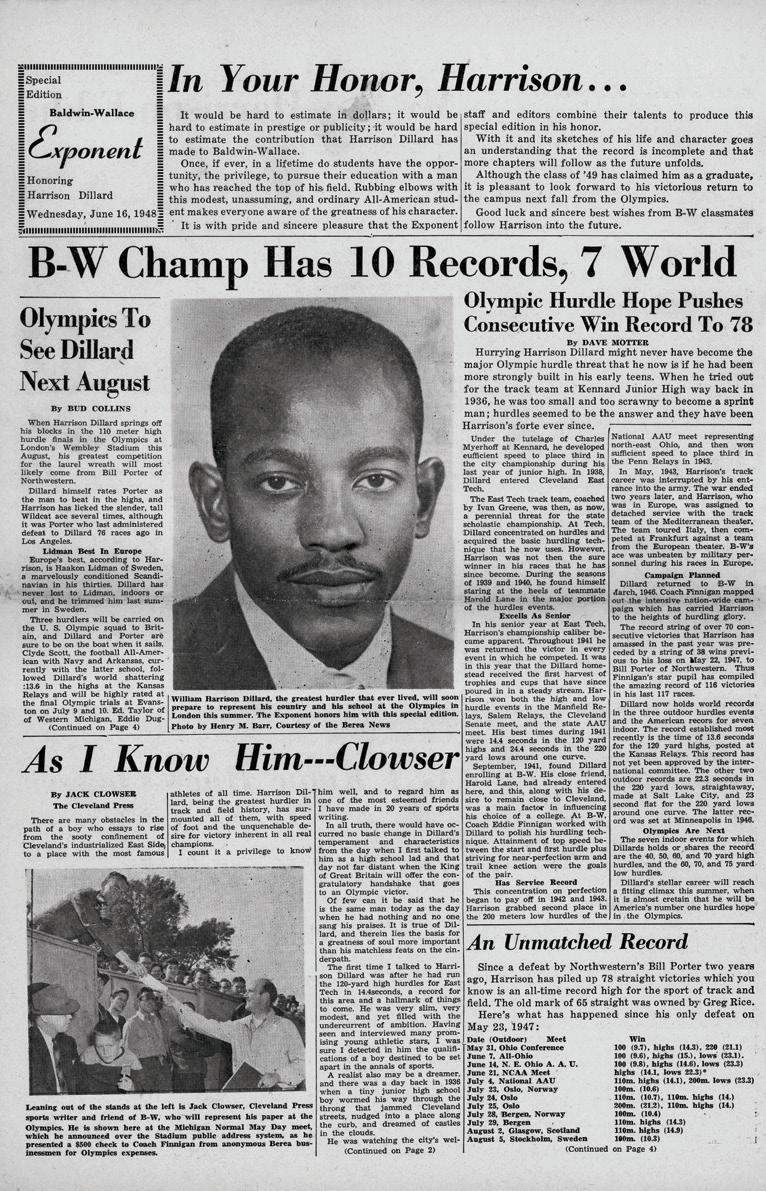
On Nov. 2, 1988 President Ronald Reagan visited campus while nearing the end of his last term. Prior to his arrival, The Exponent’s newsroom was reportedly bombarded with calls ruminating about the time and place of Reagan’s announcement. The secret service and bomb-sniffing dogs scoured the campus right before a reported 6,000 people gathered to hear Reagan speak in the gymnasium. At the event, Reagan referred to Berea as the “grindstone capital of the world.” Right next to the announcement of Reagan’s appearance, The Exponent shared the national news story of Premier cigarettes, the supposedly “safer” smokeless cigarette released by R.J. Reynolds Tobacco Company. The Premier cigarettes were reportedly distasteful and difficult to use while not leaving their smokers any healthier. The products were discontinued by the next year.
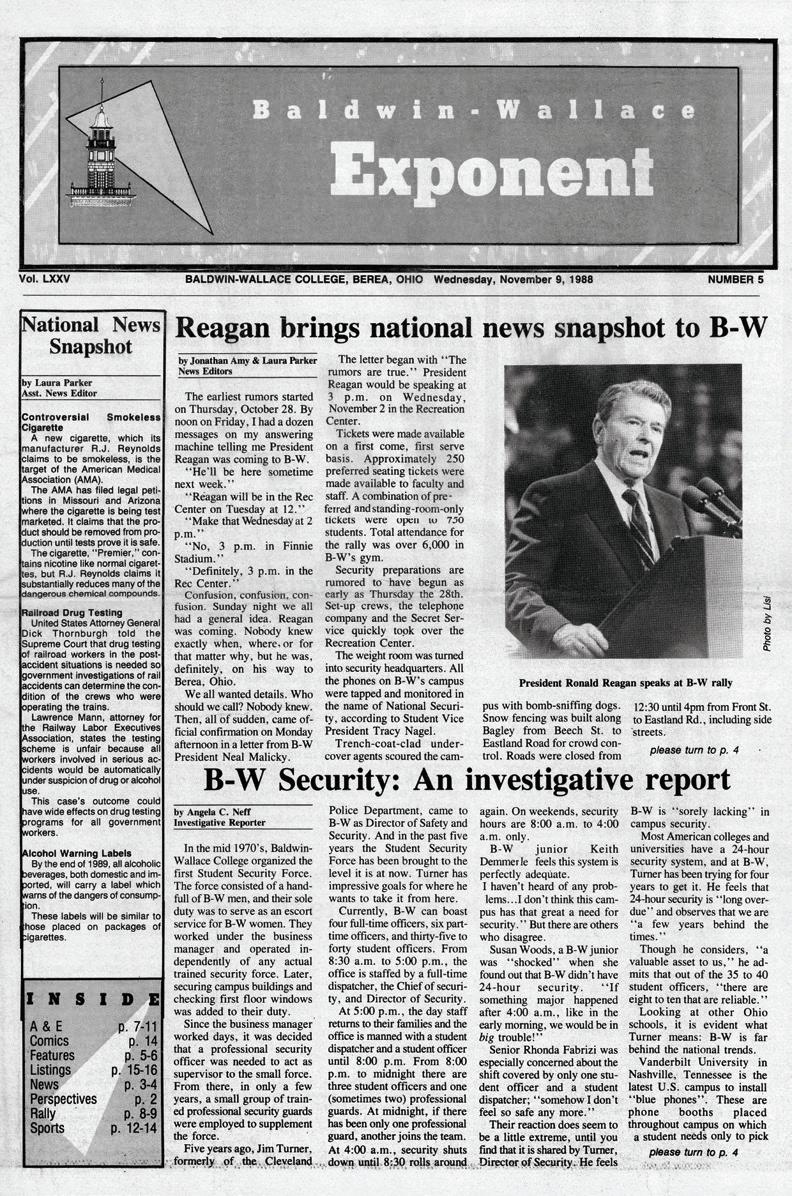
In The Exponent’s third issue of 2012, the paper covered the inauguration of President Bob Helmer, the first BW president to begin his tenure after it officially became designated as a university. Classical performances from a variety of campus musicians were strung throughout the ceremony. The invocation was provided by the then University Chaplain and associate professor of religion, John Gordon. Three of the University’s former presidents attended the inauguration to welcome Helmer including President Neil Malicky, President Mark Collier and President Richard Durst. When passing the torch in his inauguration speech, Malicky said: “You don’t live in memories, you don’t live in the past. The best days for Baldwin Wallace University are not in the past: they are in the future.”
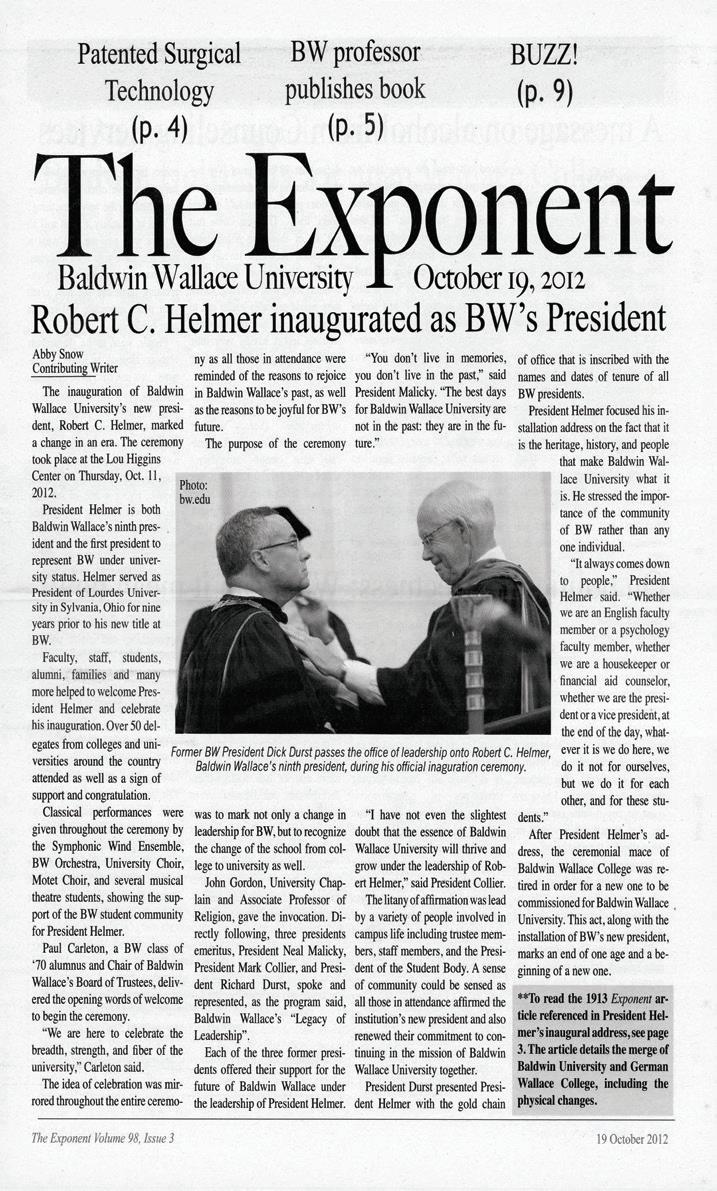
Applications for next year's staff are now open! Scan the QR code below and sign in with your BW account to apply for a position as a Staff Writer, Social Editor, Photographer or Layout Editor.



